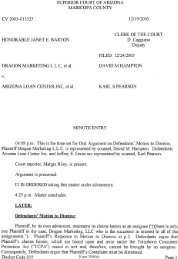ISN'T IT RICH? - American Business Media
ISN'T IT RICH? - American Business Media
ISN'T IT RICH? - American Business Media
You also want an ePaper? Increase the reach of your titles
YUMPU automatically turns print PDFs into web optimized ePapers that Google loves.
APRIL 17, 2012 | MARINES MEMORIAL CLUB, SAN FRANCISCO, CAKEYNOTE:Amy Singer, Ph.D.President & CEOTrial Consultants, Inc.Session Topics Include: Jury Trials in the New Social <strong>Media</strong> Universe Social <strong>Media</strong> Policy: Building, Monitoring andEnforcing Crisis Management: Laying Out a Clear Plan Social <strong>Media</strong> and eDiscovery Who’s Responsible: Ethics Behind Social <strong>Media</strong> Social <strong>Media</strong> Rules of Engagement and theArt of Digital Marketing/Brand Recognition Everything in Moderation - Is this Still True? Crisis Management: Laying Out a Clear PlanWe’ve had “the financial crisis, Gulf oil spill,[coal mine disasters], and people are talking aboutregulation holding down America?” Strine says.TELL US HOW YOU REALLY FEEL, LEO continued from page 81 And he didindeed award $5 million in attorneys’ fees to a major shareholder for itsrole in Black’s removal.)Two months later, Strine is still roiled about the Northwestern professor’sthesis. He says he’s not sure if Bernard Black’s data is correct, butwarns that there’s a danger if other courts start routinely interpretingDelaware law. “People should stay in their own lane,” he says, using oneof his favorite expressions. “How do you get accountability unless youget the answer from the horse’s mouth?” He adds: “We are the BergdorfGoodman, not the Dollar Store, of corporate law.”Strine doesn’t identify any particular states as running Dollar Store corporatelaw shops, but in the past he has parried with judges in other statesover the proper place for M&A litigation. In 2007 shareholder litigationover a leveraged buyout involving The Topps Company, Inc., he basicallytold New York state court judge Herbert Cahn to keep his mitts off thisdispute when different shareholder groups filed challenges to the deal inNew York and Delaware. Although Cahn refused to step back, Strine didend up issuing the controlling ruling, in which he enjoined a shareholdermeeting because he found Topps’s proxy materials misleading.The chancellor maintains that he isn’t concerned about Delaware’s“market share,” per se, but only wants to see the proper and consistentapplication of Delaware law. However, in a December 2008 speech atUtrecht University in the Netherlands, Strine spoke frankly about Delaware’sfinancial interest in keeping corporate litigation in Delaware.“For us, a small state, it is vital that we remain the leader in corporationlaw. That leadership produces thousands of Delaware jobs and nearly aquarter of our state’s budget revenues.”When corporate lawyers talk about Strine, they’ll wax rhapsodic overhis rulings in Topps, or Cox, or his discussion of takeover law in ChesapeakeCorp. v. Shore, in which he invalidated certain defensive tactics of a targetbecause they interfered with shareholders’ rights to vote on the deal.When Strine talks about his judicial career, he enjoys reminiscingabout some less famous cases. “I’ll never forget Prince the barking dog,”he says. Prince’s neighbors sued to halt the canine’s incessant yapping.Strine’s edict: “I finally had to send Prince to live somewhere else.”Strine has also resolved neighbor battles over so-called spite fences,family squabbles over wills, and emotionally wrenching guardianshipcases. Early in his tenure on the bench, he ruled in 1999 that an insurancecompany had to pay for a lung transplant for a dying woman.“The national focus on our court is business cases,” he remarks, “butthese things keep you human.”In another little-known aspect of the chancellor’s job, Strine sits onDelaware’s Board of Pardons. In January the board voted 4 to 1 to commutethe death sentence of convicted murderer Robert Gattis to life inprison. In a written ruling explaining its decision, the board noted thatone member of its panel believed that there is no moral justification forexecuting the incarcerated: “When the taking of life is not required asa matter of self-defense, that member believes that one cannot ethicallyor morally take that act.”Strine acknowledges that he is that member. “I’ve been around thedeath penalty more than I would like,” he says. As Governor Carper’scounsel, Strine had to tell wardens by phone to proceed with roughly ahalf-dozen executions. Strine struggles to describe a case that still upsetshim, in which a prisoner refused to participate in a lethal injection,and was hanged from a gallows. It particularly bothered Strine that theprisoner had to wait for many long minutes in the cold before Strinecould tell the warden to proceed. “The case with the hanging—that stillgets to me,” he says.Strine was just 28 when he left his job as an associate at the Wilmingtonoffice of Skadden, Arps, Slate, Meagher & Flom to become Carper’slegal adviser and one of his top policy aides. (Strine had worked on variousCarper campaigns since he was an undergraduateat the University of Delaware.) “GovernorCarper was an extraordinarily good governor, andwe did a lot of good things,” the judge says. “Welfarereform, charter schools, Head Start for all4-year-olds in poverty, extended day care.” Strinealso pushed to ensure that sexual orientation wasprotected under the state’s hate crime statute. Butalong the way, Strine made some enemies. “Thisis a small state. It’s a very personal place,” explainsJeffrey Bullock, who worked closely with Strineas Carper’s chief of staff, and who is now Delaware’ssecretary of state. “Leo was very, very successful, but at the sametime we had left some bruised feelings, particularly in the [state] Senate.”Bullock adds, Strine’s “wit and sense of humor gets him in troublesometimes. He can be difficult sometimes, but usually with some purpose.People sometimes misinterpret that or misunderstand.”So when Carper nominated Strine for the Chancery Court in 1998,some Republicans took aim, and his confirmation process turned into aknock-down, drag-out affair. Making matters more stressful for Strine, hisconfirmation hearing was held on his wife’s due date for their first child.There wasn’t much doubt that Strine—who graduated summa cumlaude from the University of Delaware and magna cum laude from theUniversity of Pennsylvania Law School—had the intellectual chops tobe a judge. Instead, his opponents raised the issue of whether he hadthe right judicial temperament.Strine’s nomination barely squeaked through the Delaware Senateby a vote of 12-to-8, one vote over the minimum needed. And it waswidely reported that Governor Carper had to engage in some blatantpolitical horse trading to ensure that vote: One senator got a judgeshipfor his son, and another got a political post for his son. Strine declinedto comment on the tumult over his nomination.By the time that Strine’s 12-year appointment was up in 2010, thecontroversy was far behind him. The state senate unanimously approvedhim for another term as vice-chancellor.Strine’s corporate rulings are hard to neatly characterize.In recent years he has refused to dismiss derivative claims againstformer <strong>American</strong> International Group, Inc., chairman Maurice Greenberg;he has upheld Barnes & Noble’s poison pill; he has refused to enjointhe $7 billion sale of Massey Energy Company to Alpha Natural Resources,Inc., at the request of shareholders whose derivative claims would be extinguishedby the deal; and he forced Sun-Times <strong>Media</strong> Group Inc. to paythe backbreaking legal defense bills of its former chairman Conrad Blackuntil the appeal of his criminal fraud conviction was resolved.Although he can be harsh on plaintiffs who bring weak cases, he alsocan unleash his sharp tongue against corporate titans who he believeshave crossed the line. In a ruling on a derivative suit on behalf of AIG,he used especially harsh words to describe the allegations against Greenberg.“The complaint fairly supports the assertion that AIG’s Inner Cir-The <strong>American</strong> Lawyer | March 2012 89
















